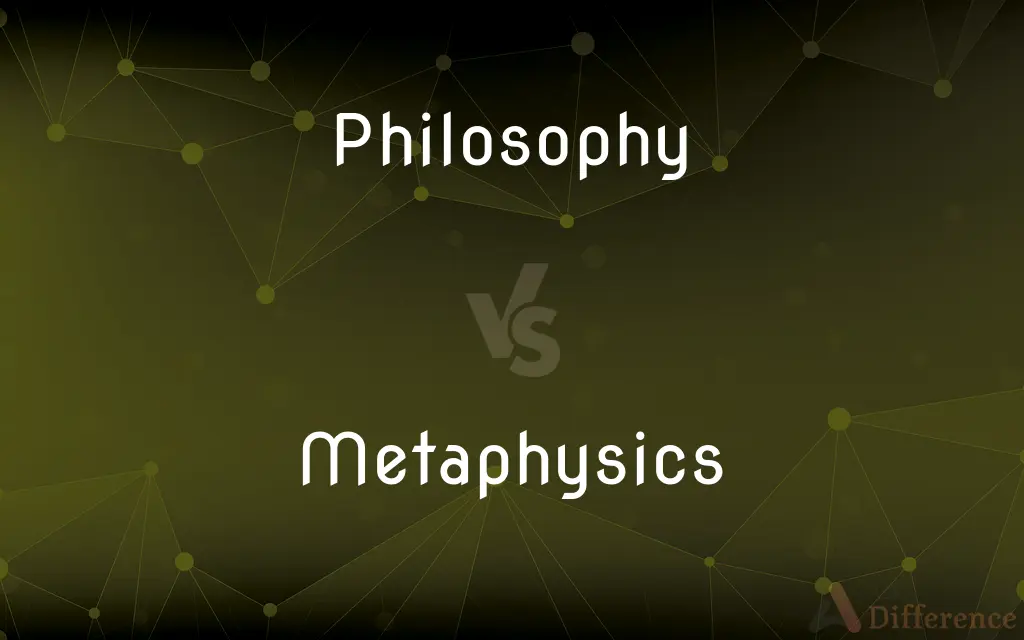Philosophy vs. Metaphysics — What's the Difference?

Difference Between Philosophy and Metaphysics
ADVERTISEMENT
Compare with Definitions
Philosophy
Philosophy (from Greek: φιλοσοφία, philosophia, 'love of wisdom') is the study of general and fundamental questions, such as those about existence, reason, knowledge, values, mind, and language. Such questions are often posed as problems to be studied or resolved.
Metaphysics
Metaphysics is the branch of philosophy that studies the first principles of being, identity and change, space and time, causality, necessity and possibility. It includes questions about the nature of consciousness and the relationship between mind and matter.
Philosophy
The study of the fundamental nature of knowledge, reality, and existence, especially when considered as an academic discipline.
Metaphysics
(used with a sing. verb) Philosophy The branch of philosophy that examines the nature of reality, including the relationship between mind and matter, substance and attribute, possibility and actuality.
Philosophy
A theory or attitude that acts as a guiding principle for behaviour
Don't expect anything and you won't be disappointed, that's my philosophy
ADVERTISEMENT
Metaphysics
(used with a pl. verb) The theoretical or first principles of a particular discipline
The metaphysics of law.
Philosophy
The study of the nature, causes, or principles of reality, knowledge, or values, based on logical reasoning.
Metaphysics
(used with a sing. verb) A priori speculation upon questions that are unanswerable to scientific observation, analysis, or experiment.
Philosophy
A system of thought based on or involving such study
The philosophy of Hume.
Metaphysics
(used with a sing. verb) Excessively subtle or recondite reasoning.
Philosophy
The study of the theoretical underpinnings of a particular field or discipline
The philosophy of history.
Metaphysics
The branch of philosophy which studies fundamental principles intended to describe or explain all that is, and which are not themselves explained by anything more fundamental; the study of first principles; the study of being insofar as it is being (Latin: ens in quantum ens).
Philosophers sometimes say that metaphysics is the study of the ultimate nature of the universe.
Philosophy
An underlying theory or set of ideas relating to a particular field of activity or to life as a whole
An original philosophy of advertising.
An unusual philosophy of life.
Metaphysics
The view or theory of a particular philosopher or school of thinkers concerning the first principles which describe or explain all that is.
The metaphysics of Thomas Aquinas holds that all real beings have both essence and existence.
In Aristotelian metaphysics physical objects have both form and matter.
In his Pensées, Pascal mentioned some first principles recognized within his metaphysics: space, time, motion, and number.
Philosophy
The love of wisdom.
Metaphysics
The metalogic of physics; the logical framework of physics.
Even other universes should be a result of different physics. Without rules, these universes wouldn't exist, because they will have an undefined, thus impossible, nature. We will never understand or guess all possible forms of physics. That's why we have to understand the generic metaphysics.
Philosophy
(uncountable) An academic discipline that seeks truth through reasoning rather than empiricism.
Philosophy is often divided into five major branches: logic, metaphysics, epistemology, ethics and aesthetics.
Metaphysics
Any fundamental principles or rules.
Philosophy
(countable) A comprehensive system of belief.
Metaphysics
(uncountable) The study of a supersensual realm or of phenomena which transcend the physical world.
I have a collection of books on metaphysics, covering astral projection, reincarnation, and communication with spirits.
Philosophy
(countable) A view or outlook regarding fundamental principles underlying some domain.
A philosophy of government;
A philosophy of education
Metaphysics
Displeasingly abstruse, complex material on any subject.
This political polemic strikes me as a protracted piece of overwrought, fog-shrouded metaphysics!
Philosophy
(countable) A general principle (usually moral).
Metaphysics
Plural of metaphysic
Philosophy
(archaic) A broader branch of (non-applied) science.
Metaphysics
The science of real as distinguished from phenomenal being; ontology; also, the science of being, with reference to its abstract and universal conditions, as distinguished from the science of determined or concrete being; the science of the conceptions and relations which are necessarily implied as true of every kind of being; philosophy in general; first principles, or the science of first principles.
Commonly, in the schools, called metaphysics, as being part of the philosophy of Aristotle, which hath that for title; but it is in another sense: for there it signifieth as much as "books written or placed after his natural philosophy." But the schools take them for "books of supernatural philosophy;" for the word metaphysic will bear both these senses.
Now the science conversant about all such inferences of unknown being from its known manifestations, is called ontology, or metaphysics proper.
Metaphysics are [is] the science which determines what can and what can not be known of being, and the laws of being, a priori.
Philosophy
A calm and thoughtful demeanor; calmness of temper.
Metaphysics
The scientific knowledge of mental phenomena; mental philosophy; psychology.
Metaphysics, in whatever latitude the term be taken, is a science or complement of sciences exclusively occupied with mind.
Whether, after all,A larger metaphysics might not helpOur physics.
Philosophy
Synonym of small pica.
Metaphysics
The philosophical study of being and knowing
Philosophy
To philosophize.
Philosophy
Literally, the love of, inducing the search after, wisdom; in actual usage, the knowledge of phenomena as explained by, and resolved into, causes and reasons, powers and laws.
Philosophy
A particular philosophical system or theory; the hypothesis by which particular phenomena are explained.
[Books] of Aristotle and his philosophie.
We shall in vain interpret their words by the notions of our philosophy and the doctrines in our school.
Philosophy
Practical wisdom; calmness of temper and judgment; equanimity; fortitude; stoicism; as, to meet misfortune with philosophy.
Then had he spent all his philosophy.
Philosophy
Reasoning; argumentation.
Of good and evil much they argued then, . . . Vain wisdom all, and false philosophy.
Philosophy
The course of sciences read in the schools.
Philosophy
A treatise on philosophy.
Philosophy
A belief (or system of beliefs) accepted as authoritative by some group or school
Philosophy
The rational investigation of questions about existence and knowledge and ethics
Philosophy
Any personal belief about how to live or how to deal with a situation;
Self-indulgence was his only philosophy
My father's philosophy of child-rearing was to let mother do it
Share Your Discovery

Previous Comparison
Analysis vs. Algebra
Next Comparison
Diorama vs. Panorama













































